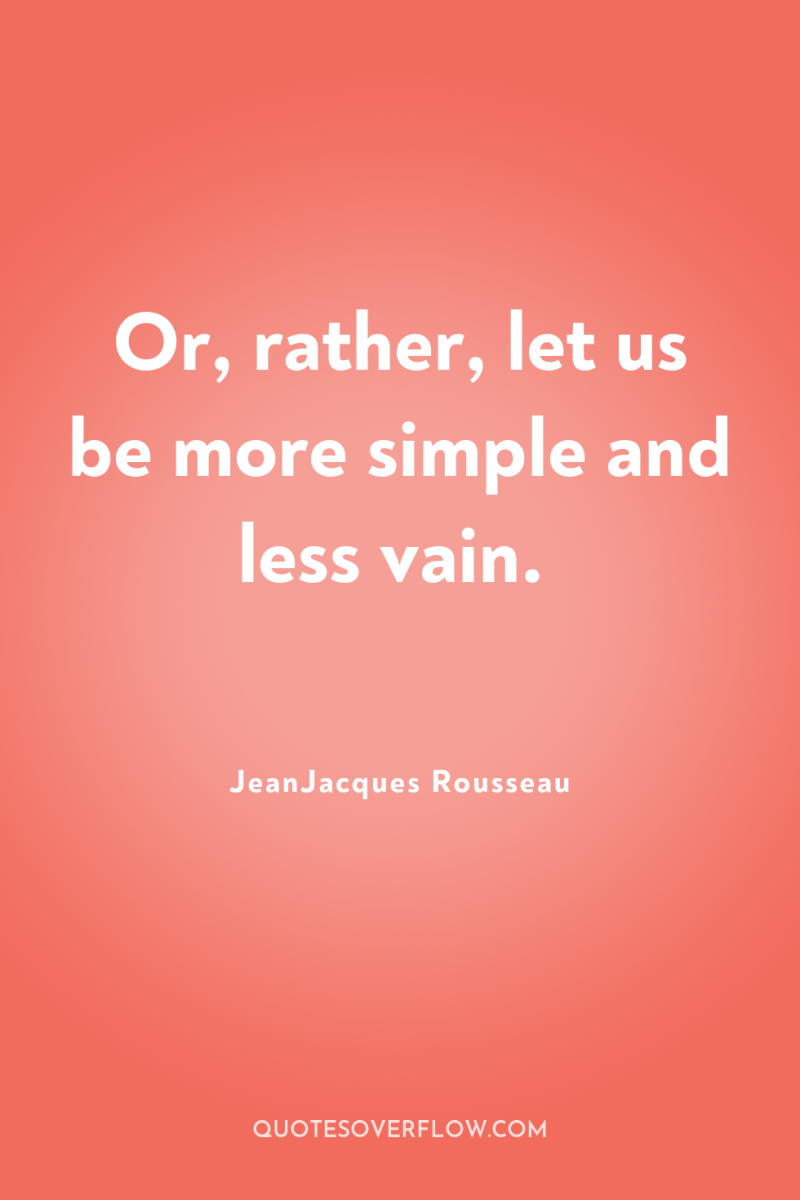
1
Or, rather, let us be more simple and less vain.JeanJacques Rousseau
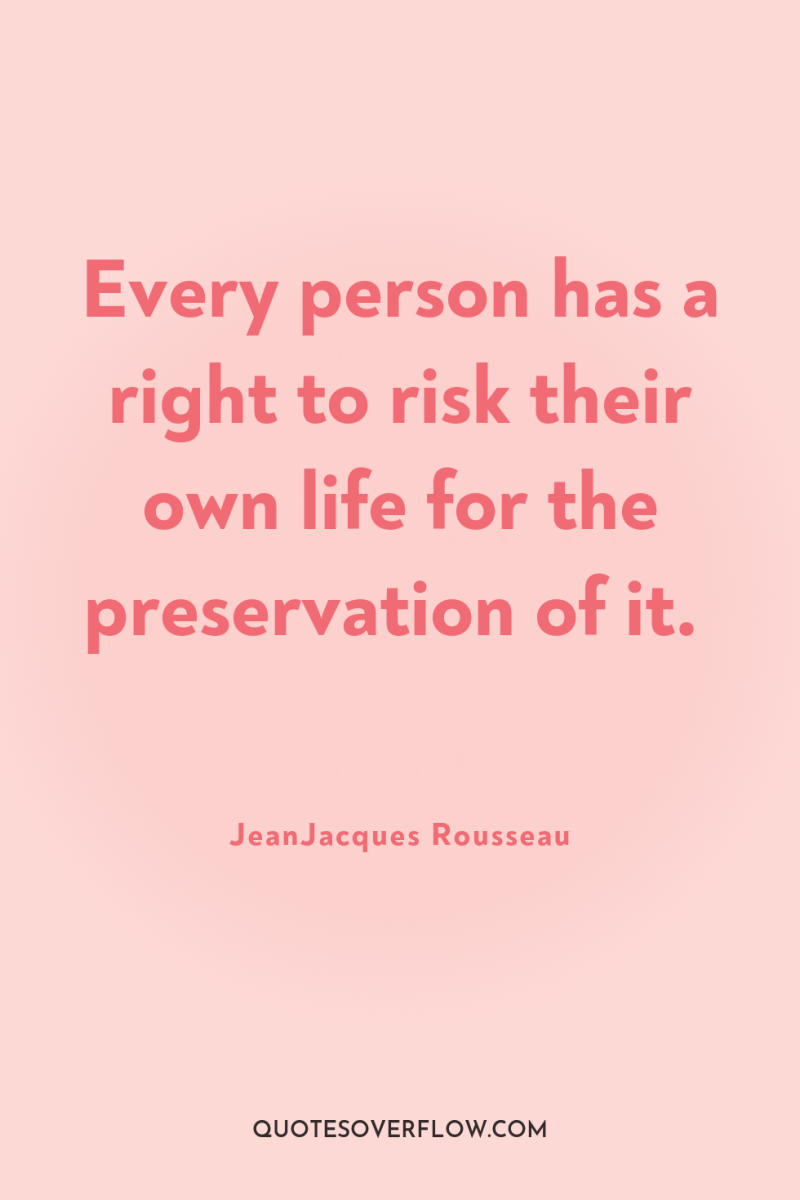
2
Every person has a right to risk their own life for the preservation of it.JeanJacques Rousseau
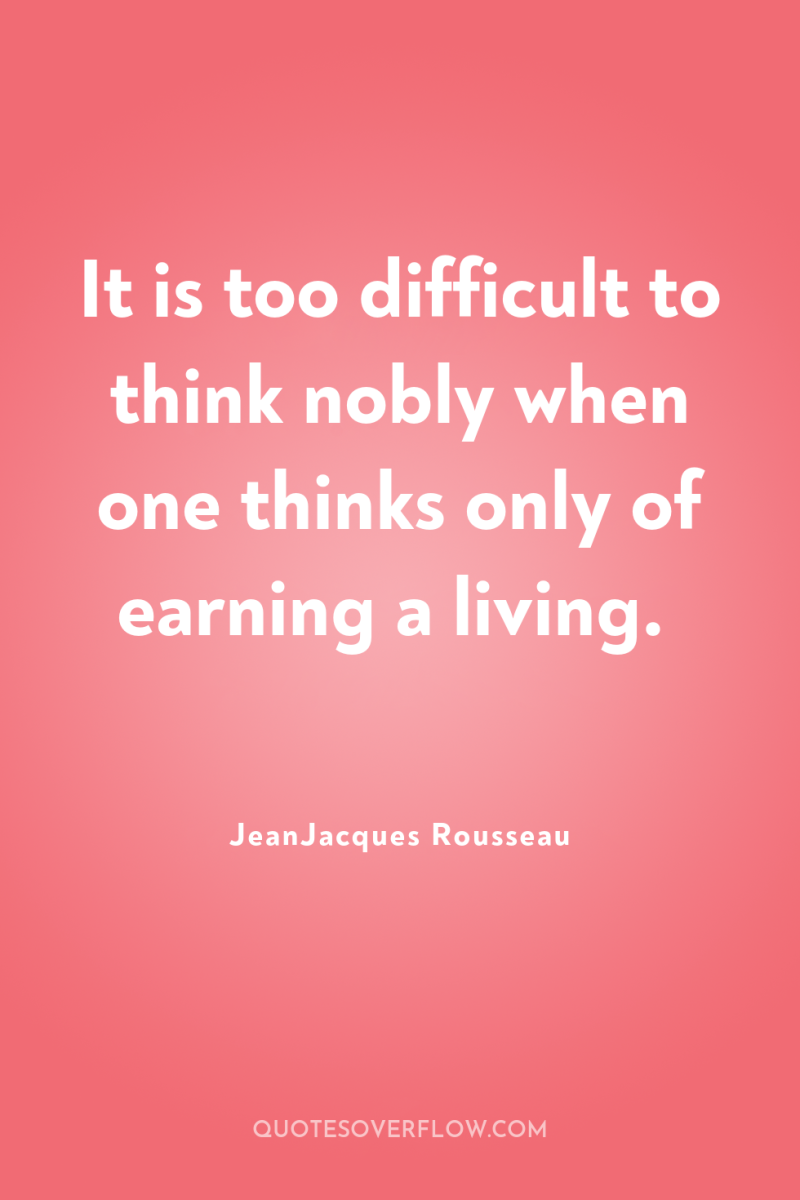
3
It is too difficult to think nobly when one thinks only of earning a living.JeanJacques Rousseau
4
To live is not to breathe but to act. It is to make use of our organs, our senses, our faculties, of all the parts of ourselves which give us the sentiment of our existence. The man who has lived the most is not he who has counted the most years but he who has most felt life.JeanJacques Rousseau
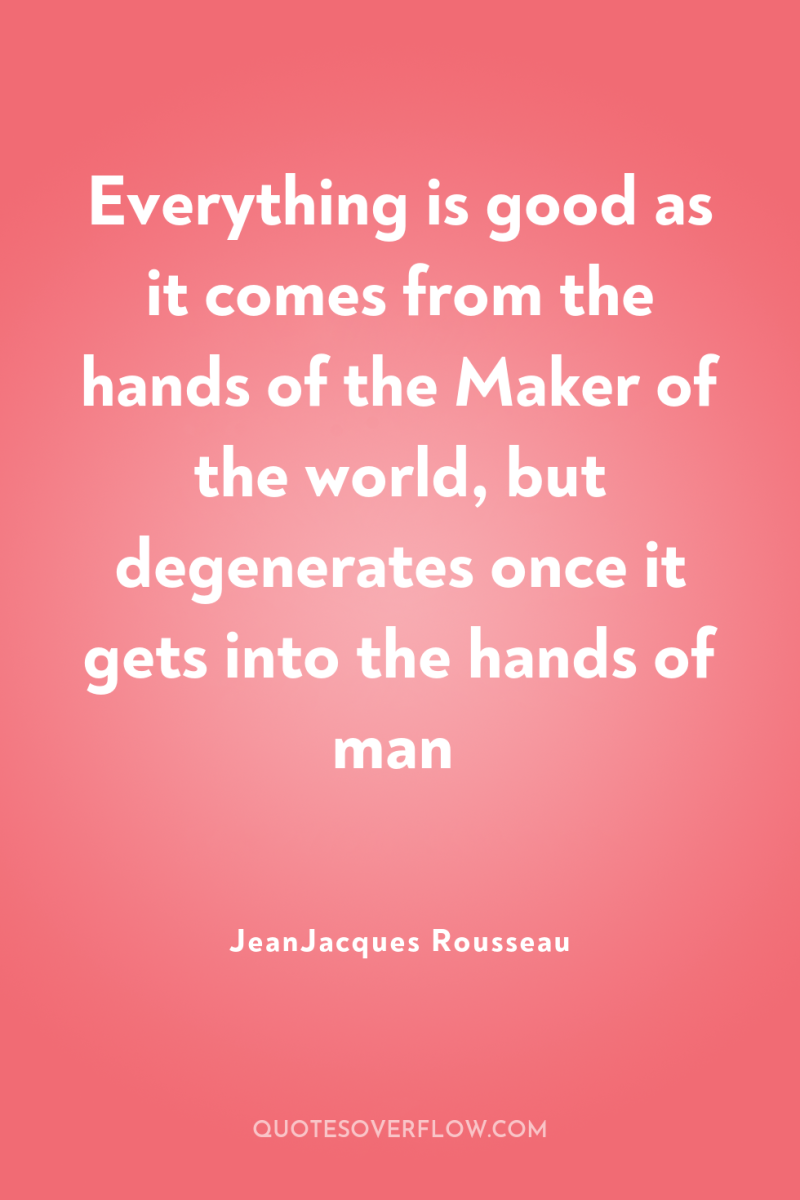
5
Everything is good as it comes from the hands of the Maker of the world, but degenerates once it gets into the hands of manJeanJacques Rousseau
6
I believed that I was approaching the end of my days without having tasted to the full any of the pleasures for which my heart thirsted..without having ever tasted that passion which, through lack of an object, was always suppressed..The impossibility of attaining the real persons precipitated me into the land of chimeras; and seeing nothing that existed worthy of my exalted feelings, I fostered them in an ideal world which my creative imagination soon peopled with beings after my own heart.JeanJacques Rousseau
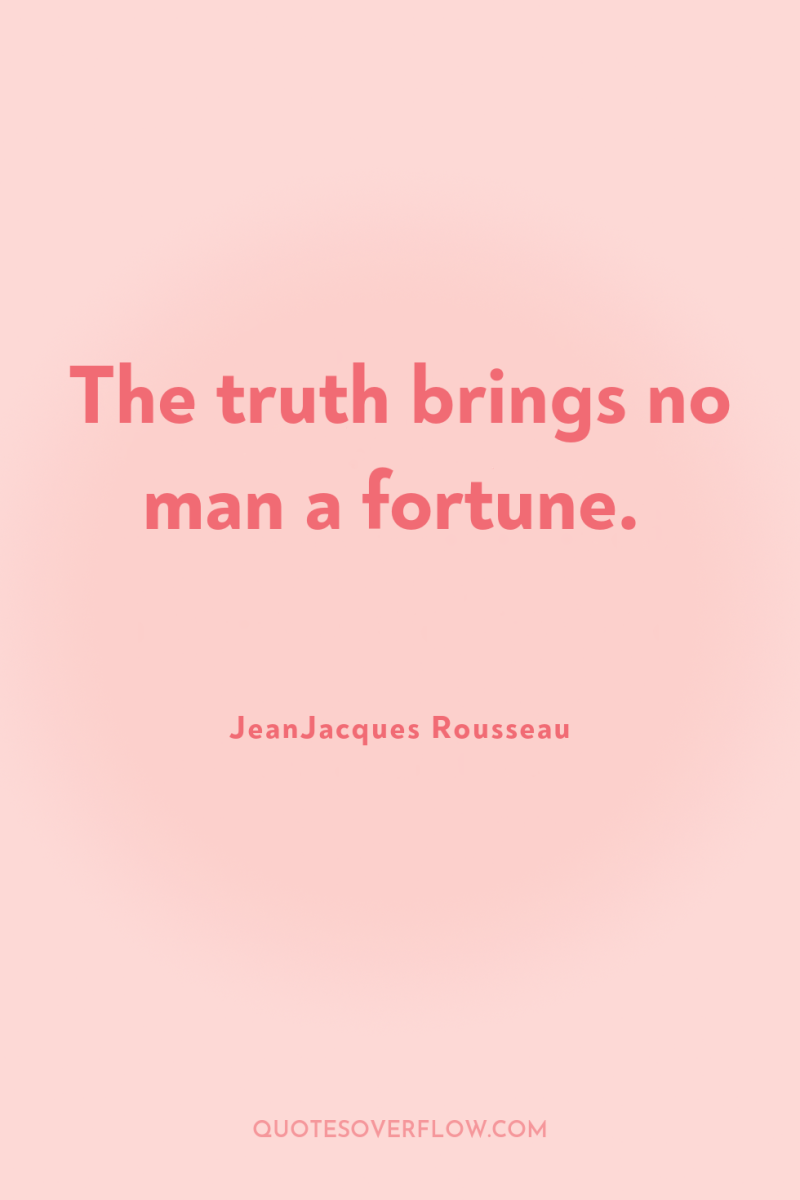
7
The truth brings no man a fortune.JeanJacques Rousseau
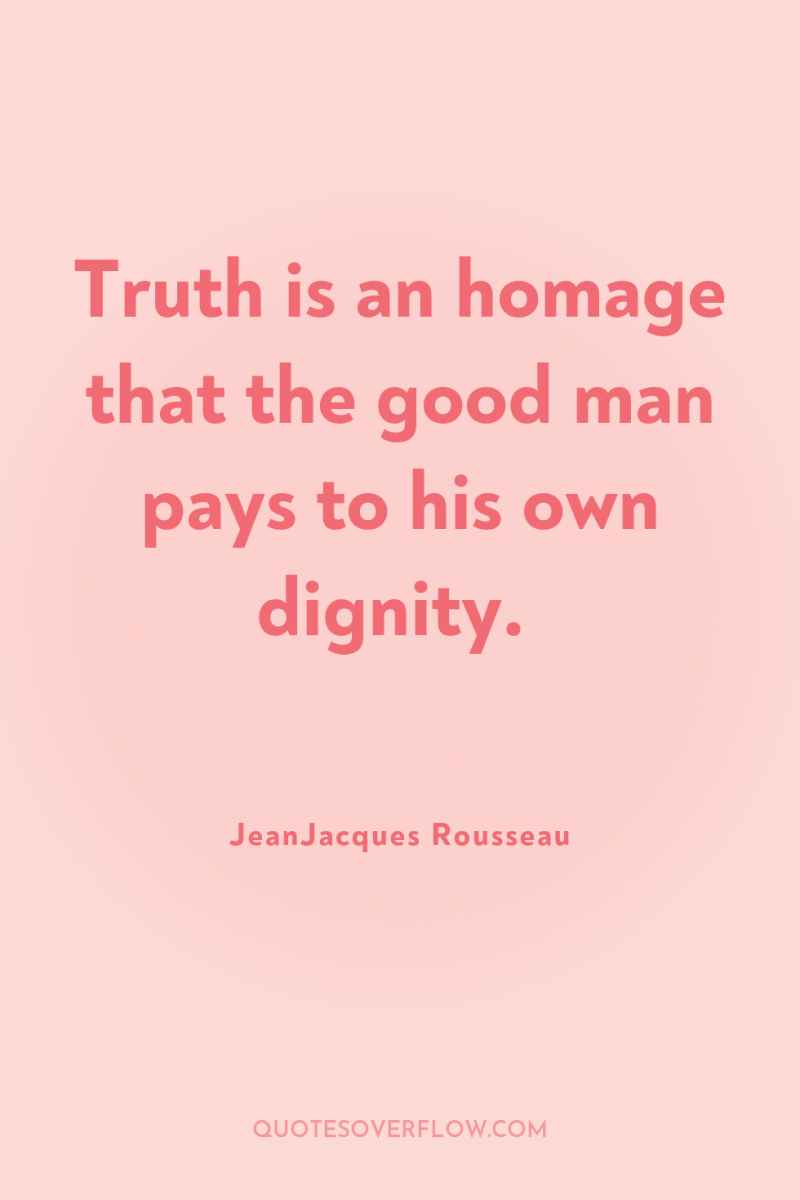
8
Truth is an homage that the good man pays to his own dignity.JeanJacques Rousseau
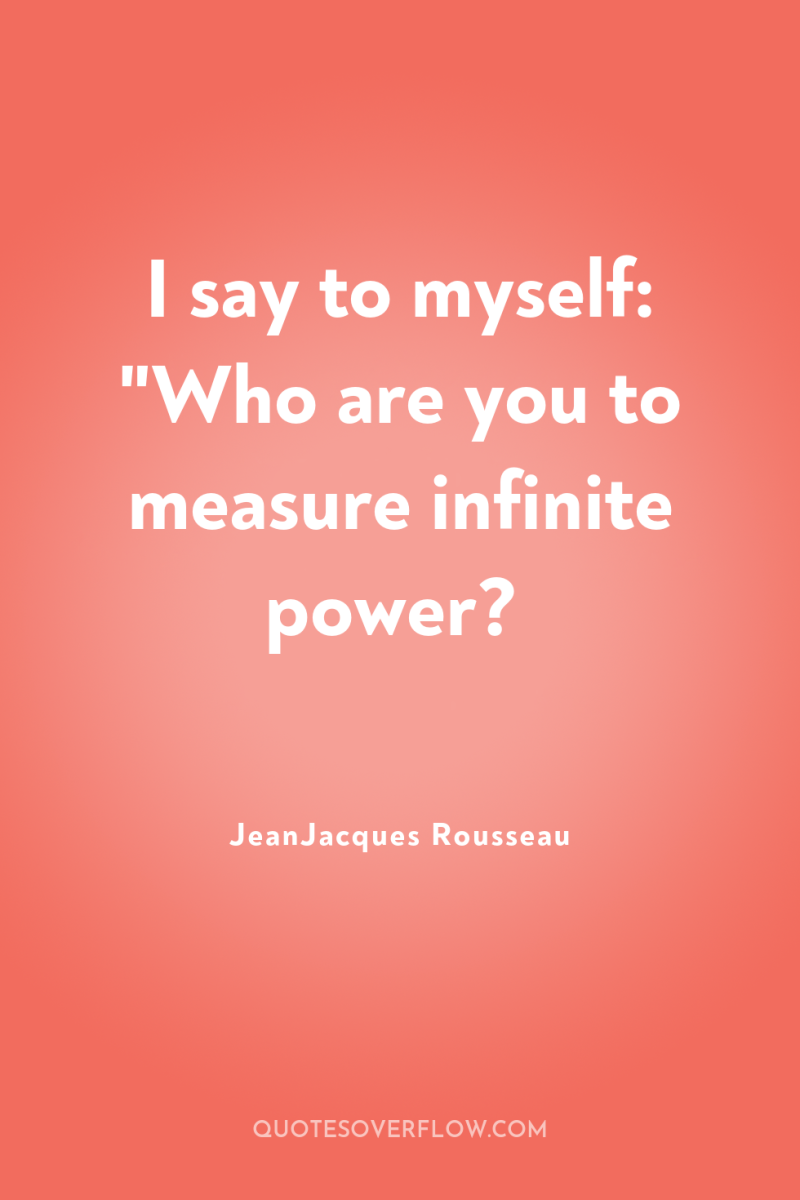
9
I say to myself: "Who are you to measure infinite power?JeanJacques Rousseau
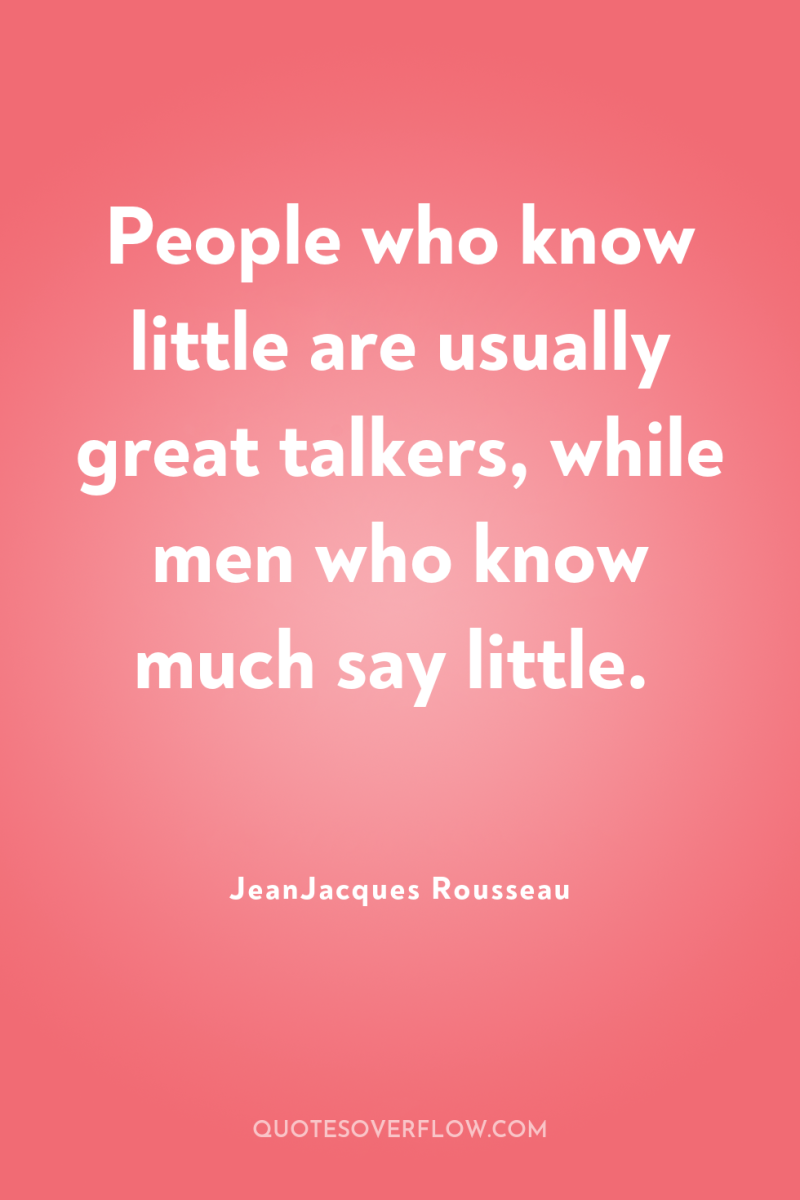
10
People who know little are usually great talkers, while men who know much say little.JeanJacques Rousseau
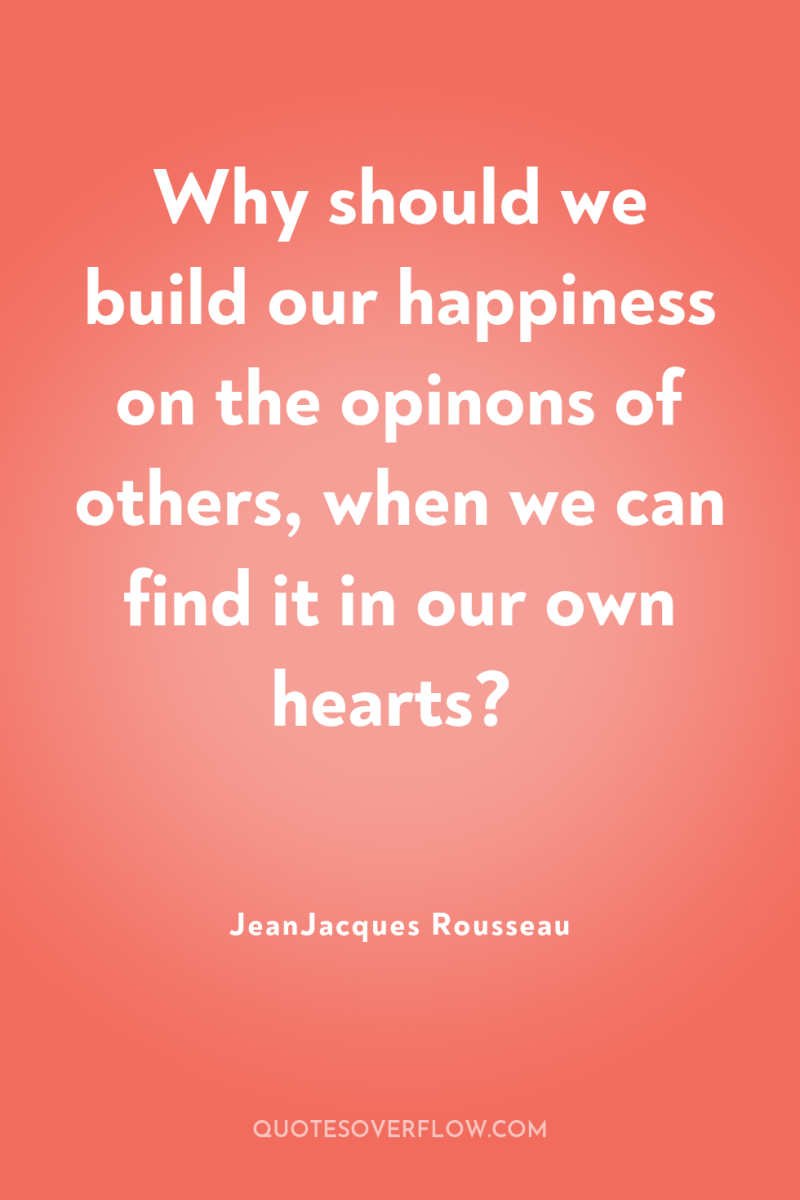
11
Why should we build our happiness on the opinons of others, when we can find it in our own hearts?JeanJacques Rousseau
12
Being wealthy isn't just a question of having lots of money. It's a question of what we want. Wealth isn't an absolute, it's relative to desire. Every time we seek something that we can't afford, we can be counted as poor, how much money we may actually have.JeanJacques Rousseau
13
So finally we tumble into the abyss, we ask God why he has made us so feeble. But, in spite of ourselves, He replies through our consciences: 'I have made you too feeble to climb out of the pit, because i made you strong enough not to fall in.JeanJacques Rousseau
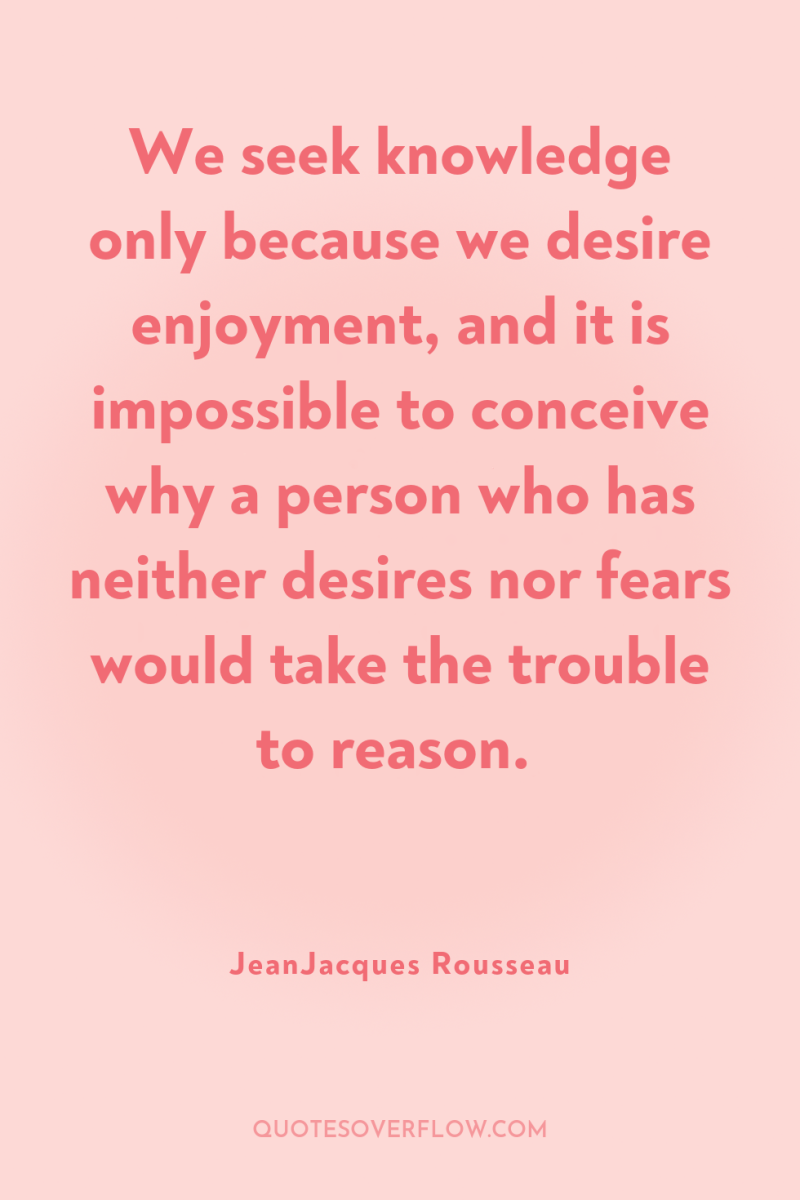
14
We seek knowledge only because we desire enjoyment, and it is impossible to conceive why a person who has neither desires nor fears would take the trouble to reason.JeanJacques Rousseau
15
Teach your scholar to observe the phenomena of nature; you will soon rouse his curiosity, but if you would have it grow, do not be in too great a hurry to satisfy this curiosity. Put the problems before him and let him solve them himself. Let him know nothing because you have told him, but because he has learnt it for himself. Let him not be taught science, let him discover it. If ever you substitute authority for reason he will cease to reason; he will be a mere plaything of other people's thoughts.JeanJacques Rousseau
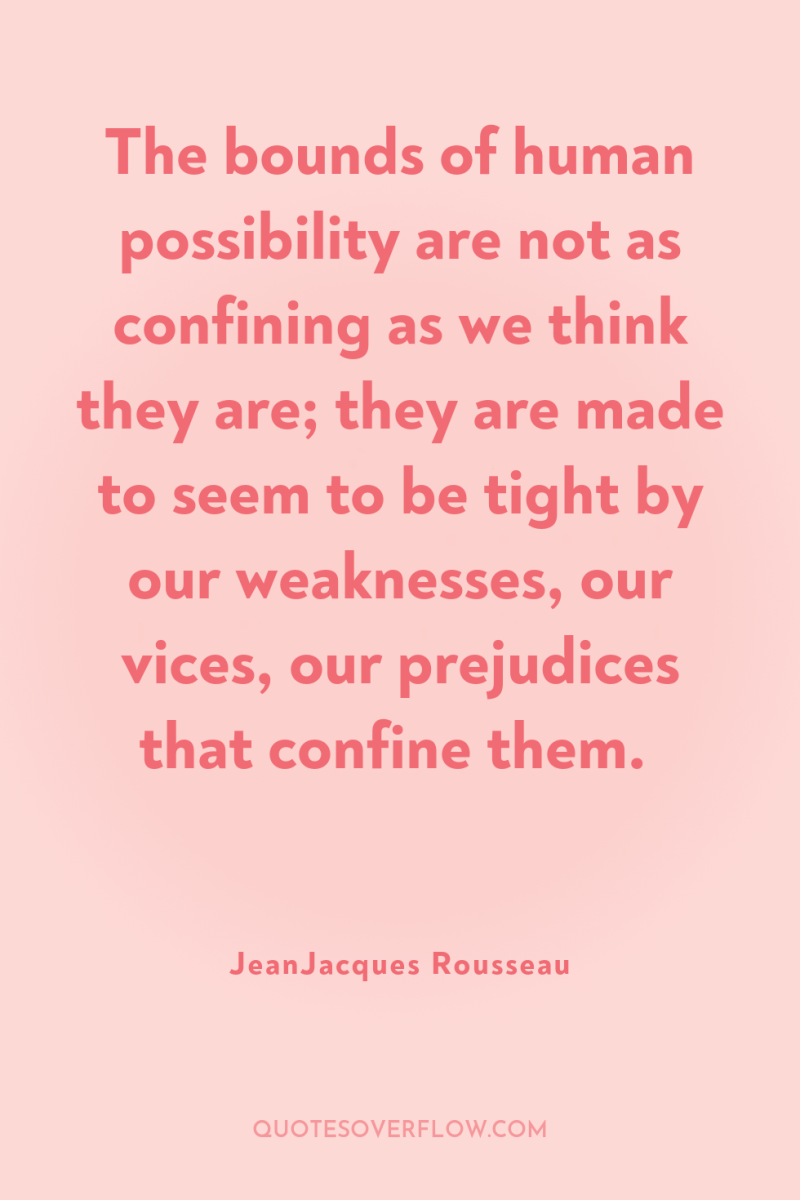
16
The bounds of human possibility are not as confining as we think they are; they are made to seem to be tight by our weaknesses, our vices, our prejudices that confine them.JeanJacques Rousseau
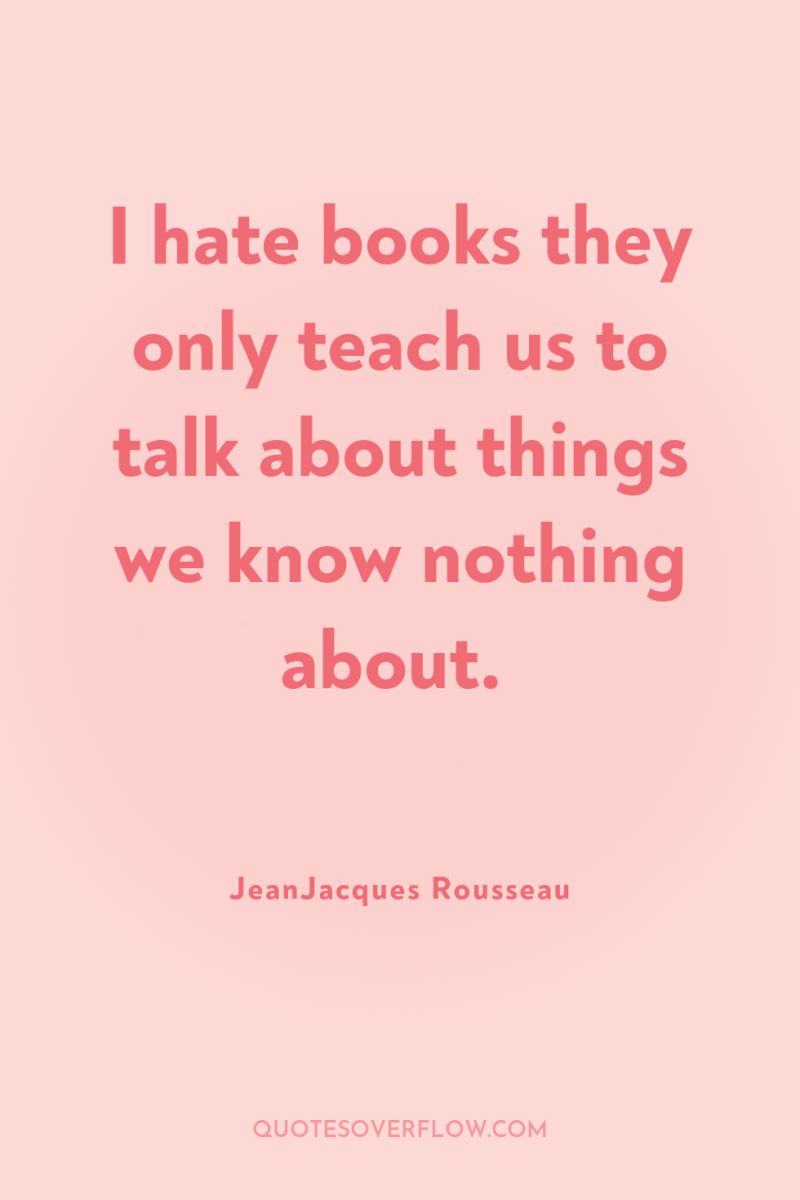
17
I hate books they only teach us to talk about things we know nothing about.JeanJacques Rousseau
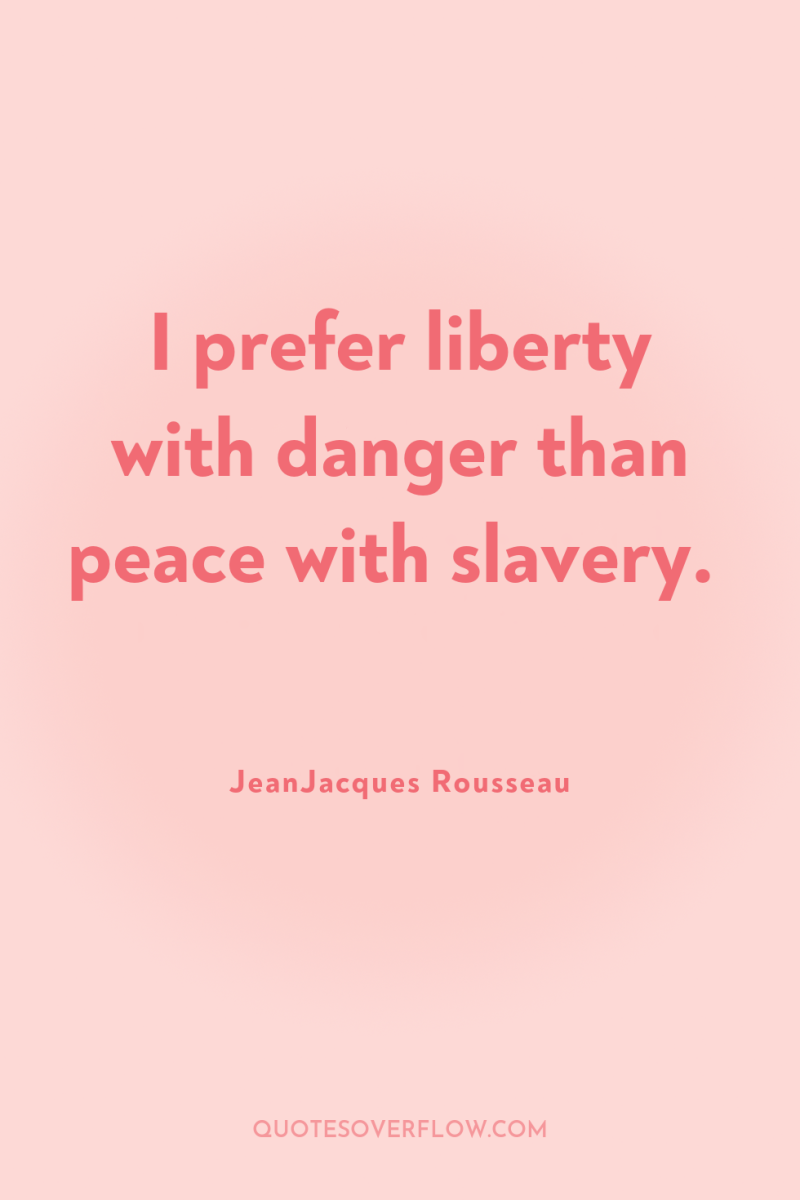
18
I prefer liberty with danger than peace with slavery.JeanJacques Rousseau
19
Every man having been born free and master of himself, no one else may under any pretext whatever subject him without his consent. To assert that the son of a slave is born a slave is to assert that he is not born a man.JeanJacques Rousseau
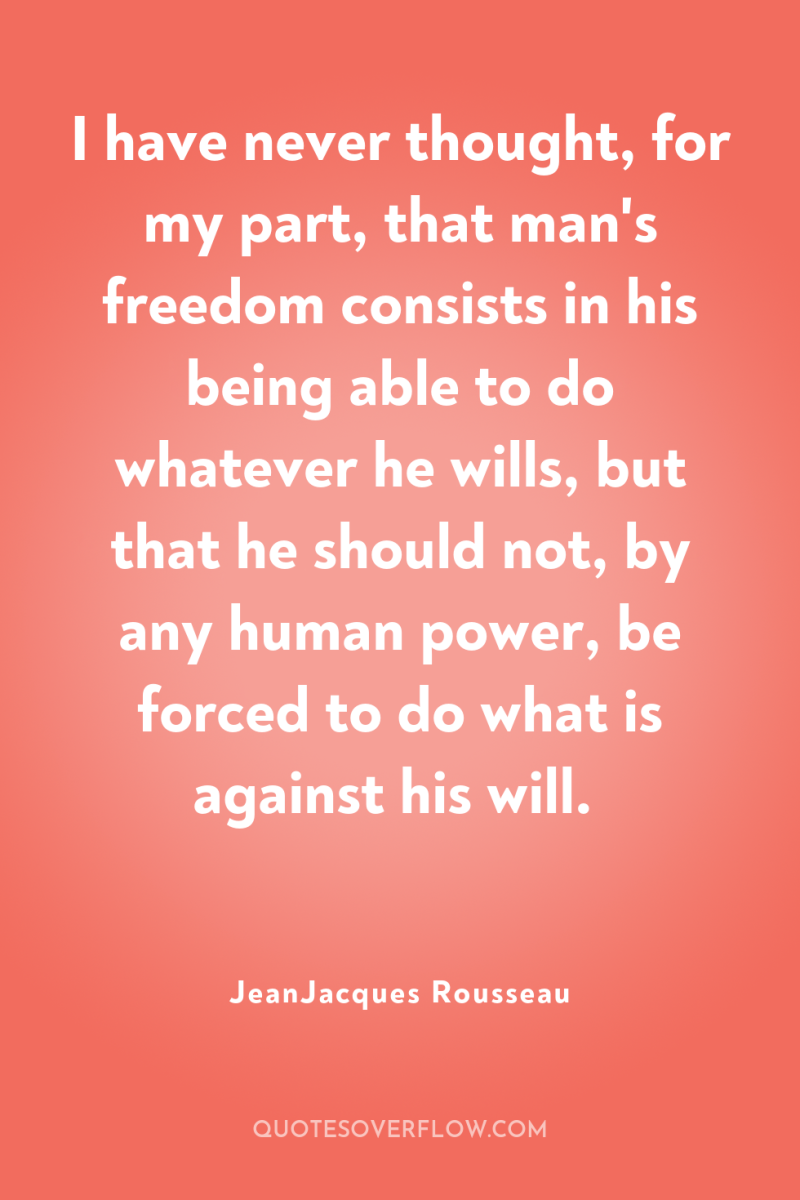
20
I have never thought, for my part, that man's freedom consists in his being able to do whatever he wills, but that he should not, by any human power, be forced to do what is against his will.JeanJacques Rousseau
21
The word ‘slavery’ and ‘right’ are contradictory, they cancel each other out. Whether as between one man and another, or between one man and a whole people, it would always be absurd to say: "I hereby make a covenant with you which is wholly at your expense and wholly to my advantage; I will respect it so long as I please and you shall respect it as long as I wish.JeanJacques Rousseau
22
An unbroken horse erects his mane, paws the ground and starts back impetuously at the sight of the bridle; while one which is properly trained suffers patiently even whip and spur: so savage man will not bend his neck to the yoke to which civilised man submits without a murmur, but prefers the most turbulent state of liberty to the most peaceful slavery. We cannot therefore, from the servility of nations already enslaved, judge of the natural disposition of mankind for or against slavery; we should go by the prodigious efforts of every free people to save itself from oppression. I know that the former are for ever holding forth in praise of the tranquillity they enjoy in their chains, and that they call a state of wretched servitude a state of peace: miserrimam servitutem pacem appellant. But when I observe the latter sacrificing pleasure, peace, wealth, power and life itself to the preservation of that one treasure, which is so disdained by those who have lost it; when I see free-born animals dash their brains out against the bars of their cage, from an innate impatience of captivity; when I behold numbers of naked savages, that despise European pleasures, braving hunger, fire, the sword and death, to preserve nothing but their independence, I feel that it is not for slaves to argue about liberty. .JeanJacques Rousseau
23
I know that [civilized men] do nothing but boast incessantly of the peace and repose they enjoy in their chains.. But when I see [barbarous man] sacrifice pleasures, repose, wealth, power, and life itself for the preservation of this sole good which is so disdained by those who have lost it; when I see animals born free and despising captivity break their heads against the bars of their prison; when I see multitudes of entirely naked savages scorn European voluptuousness and endure hunger, fire, the sword, and death to preserve only their independence, I feel it does not behoove slaves to reason about freedom.JeanJacques Rousseau
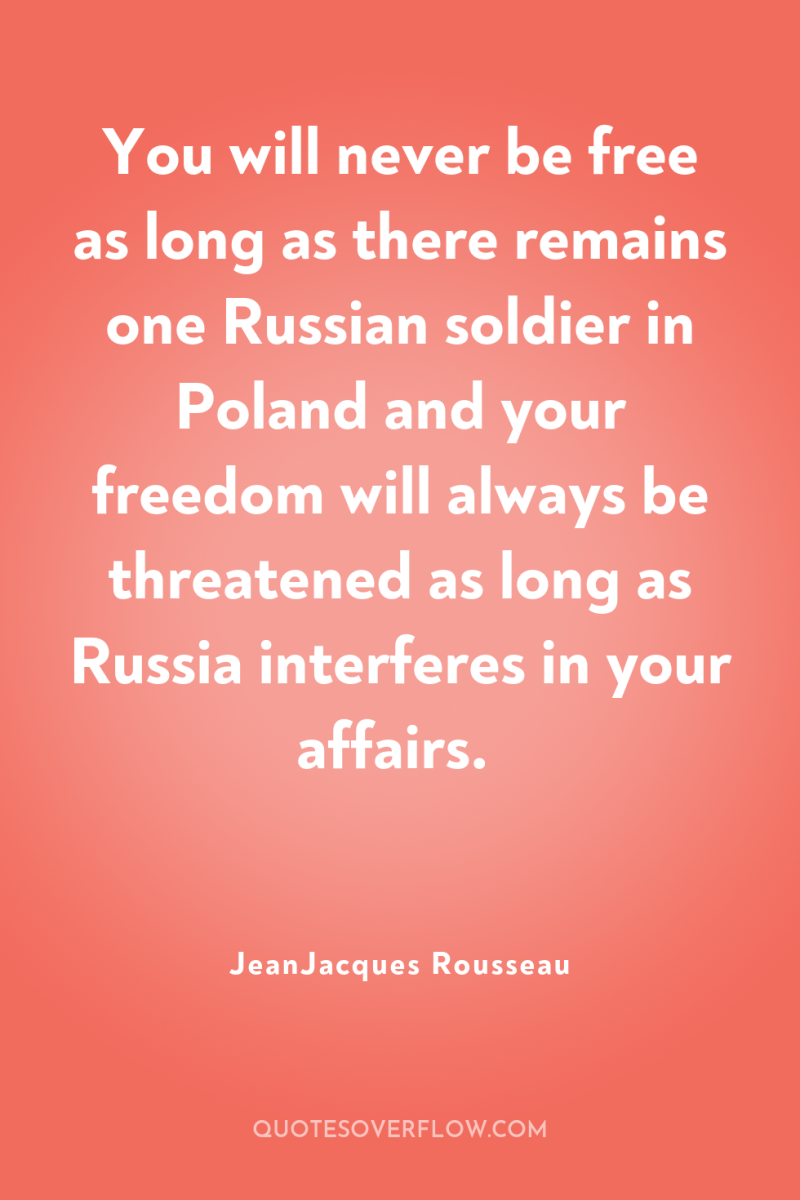
24
You will never be free as long as there remains one Russian soldier in Poland and your freedom will always be threatened as long as Russia interferes in your affairs.JeanJacques Rousseau
25
The first man who, having fenced in a piece of land, said "This is mine, " and found people naïve enough to believe him, that man was the true founder of civil society. From how many crimes, wars, and murders, from how many horrors and misfortunes might not any one have saved mankind, by pulling up the stakes, or filling up the ditch, and crying to his fellows: Beware of listening to this impostor; you are undone if you once forget that the fruits of the earth belong to us all, and the earth itself to nobody.JeanJacques Rousseau
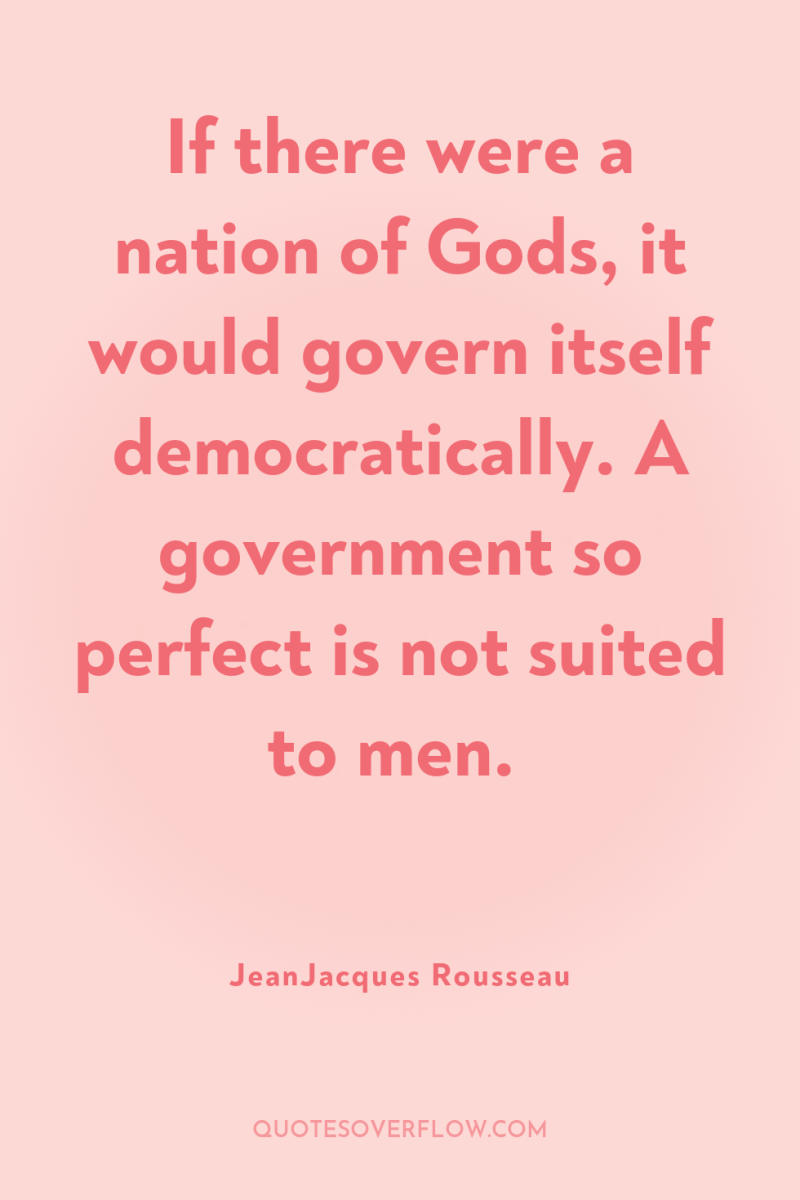
26
If there were a nation of Gods, it would govern itself democratically. A government so perfect is not suited to men.JeanJacques Rousseau
27
Women, for their part, are always complaining that we raise them only to be vain and coquettish, that we keep them amused with trifles so that we may more easily remain their masters; they blame us for the faults we attribute to them. What stupidity! And since when is it men who concern themselves with the education of girls? Who is preventing the mothers from raising them as they please? There are no schools for girls–what a tragedy! Would God, there were none for boys! They would be raised more sensibly and more straightforwardly. Is anyone forcing your daughters to waste their time on foolish trifles? Are they forced against their will to spend half their lives on their appearance, following your example? Are you prevented from instructing them, or having them instructed according to your wishes? Is it our fault if they please us when they are beautiful, if their airs and graces seduce us, if the art they learn from you attracts and flatters us, if we like to see them tastefully attired, if we let them display at leisure the weapons with which they subjugate us? Well then, decide to raise them like men; the men will gladly agree; the more women want to resemble them, the less women will govern them, and then men will truly be the masters.JeanJacques Rousseau
28
The decent man and the lover holds back even when he could obtain what he wishes. To win this silent consent is to make use of all the violence permitted in love. To read it in the eyes, to see it in the ways in spite of the mouth's denial, that is the art of he who knows how to love. If he then completes his happiness, he is not brutal, he is decent. He does not insult chasteness; he respects it; he serves it.JeanJacques Rousseau
29
Why do you consult [women's] words when it is not their mouths that speak? Consult their eyes, their colour, their breathing, their timid manner, their slight resistance, that is the language nature gave them for your answer. The lips always say 'No, ' and rightly so; but the tone is not always the same, and that cannot lie. Has not a woman the same needs as a man, but without the same right to make them known? Her fate would be too cruel if she had no language in which to express her legitimate desires except the words which she dare not utter.JeanJacques Rousseau
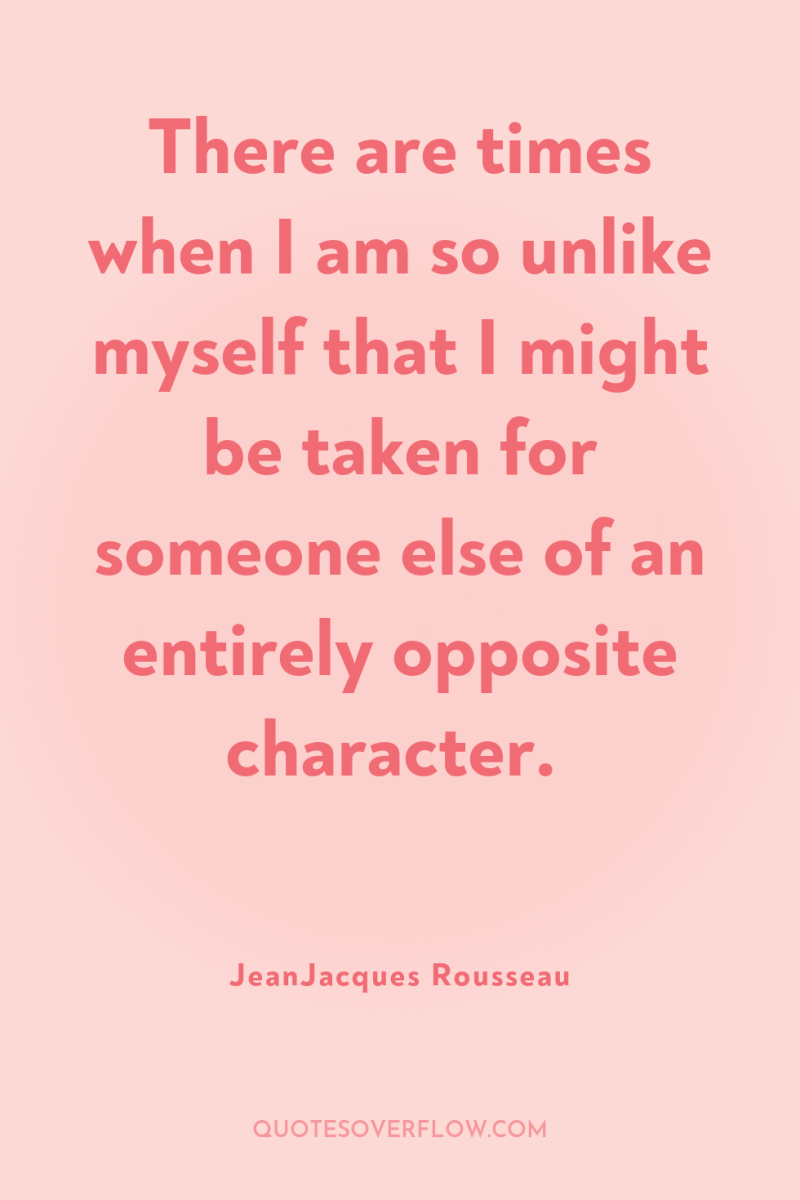
30
There are times when I am so unlike myself that I might be taken for someone else of an entirely opposite character.JeanJacques Rousseau
31
The extreme inequality of our ways of life, the excess of idleness among some and the excess of toil among others, the ease of stimulating and gratifying our appetites and our senses, the over-elaborate foods of the rich, which inflame and overwhelm them with indigestion, the bad food of the poor, which they often go withotu altogether, so hat they over-eat greedily when they have the opportunity; those late nights, excesses of all kinds, immoderate transports of every passion, fatigue, exhaustion of mind, the innumerable sorrows and anxieties that people in all classes suffer, and by which the human soul is constantly tormented: these are the fatal proofs that most of our ills are of our own making, and that we might have avoided nearly all of them if only we had adhered to the simple, unchanging and solitary way of life that nature ordained for us.JeanJacques Rousseau
32
From this moment there would be no question of virtue or morality; for despotism cui ex honesto nulla est spes, wherever it prevails, admits no other master; it no sooner speaks than probity and duty lose their weight and blind obedience is the only virtue which slaves can still practice.JeanJacques Rousseau
33
The first man, who, after enclosing a piece of ground, took it into his head to say, "This is mine, " and found people simple enough to believe him, was the true founder of civil society.JeanJacques Rousseau
34
When I stay in one Place, I can hardly think at all; my body had to be on the move to set my mind going." Jean-Jacques Rousseau.JeanJacques Rousseau
35
I hear from afar the shouts of that false wisdom which is ever dragging us onwards, counting the present as nothing, and pursuing without pause a future which flies as we pursue, that false wisdom which removes us from our place and never brings us to any other.JeanJacques Rousseau
36
Europe had fallen back into the barbarity of the first ages. People from this part of world, so enlightened today, lived a few centuries ago in a state worse than ignorance. Some sort of learned jargon much more despicable than ignorance had usurped the name of knowledge and set up an almost invincible obstacle in the way of its return. A revolution was necessary to bring men back to common sense, and it finally came from a quarter where one would least expect it. It was the stupid Muslim, the eternal blight on learning, who brought about its rebirth among us.JeanJacques Rousseau
37
Among the many short cuts to science, we badly need someone to teach us the art of learning with difficulty.JeanJacques Rousseau
38
The real world has its limits; the imaginary world is infinite. Unable to enlarge the one, let us restrict the other, for it is from the difference between the two alone that are born all the pains which make us truly unhappy.JeanJacques Rousseau
39
Hold childhood in reverence, and do not be in any hurry to judge it for good or ill. Leave exceptional cases to show themselves, let their qualities be tested and confirmed, before special methods are adopted. Give nature time to work before you take over her business, lest you interfere with her dealings. You assert that you know the value of time and are afraid to waste it. You fail to perceive that it is a greater waste of time to use it ill than to do nothing, and that a child ill taught is further from virtue than a child who has learnt nothing at all. You are afraid to see him spending his early years doing nothing. What! is it nothing to be happy, nothing to run and jump all day? He will never be so busy again all his life long. Plato, in his Republic, which is considered so stern, teaches the children only through festivals, games, songs, and amusements. It seems as if he had accomplished his purpose when he had taught them to be happy; and Seneca, speaking of the Roman lads in olden days, says, "They were always on their feet, they were never taught anything which kept them sitting." Were they any the worse for it in manhood? Do not be afraid, therefore, of this so-called idleness. What would you think of a man who refused to sleep lest he should waste part of his life? You would say, "He is mad; he is not enjoying his life, he is robbing himself of part of it; to avoid sleep he is hastening his death." Remember that these two cases are alike, and that childhood is the sleep of reason. The apparent ease with which children learn is their ruin. You fail to see that this very facility proves that they are not learning. Their shining, polished brain reflects, as in a mirror, the things you show them, but nothing sinks in. The child remembers the words and the ideas are reflected back; his hearers understand them, but to him they are meaningless. Although memory and reason are wholly different faculties, the one does not really develop apart from the other. Before the age of reason the child receives images, not ideas; and there is this difference between them: images are merely the pictures of external objects, while ideas are notions about those objects determined by their relations. .JeanJacques Rousseau
40
A taste for ostentation is rarely associated in the same souls with a taste for honestyJeanJacques Rousseau
41
The sword wears out its sheath, as it is sometimes said. That is my story. My passions have made me live, and my passions have killed me. What passions, it may be asked. Trifles, the most childish things in the world. Yet they affected me as much as if the possessions of Helen, or the throne of the Universe, had been at stake.JeanJacques Rousseau
42
She was dull, unattractive, couldn't tell the time, count money or tie her own shoe laces... But I loved herJeanJacques Rousseau
43
Such is the pure movement of nature prior to all reflection. Such is the force of natural pity, which the most depraved mores still have difficulty destroying, since everyday one sees in our theaters someone affected and weeping at the ills of some unfortunate person, and who, were he in the tyrant's place, would intensify the torments of his enemy still more; [like the bloodthirsty Sulla, so sensitive to ills he had not caused, or like Alexander of Pherae, who did not dare attend the performance of any tragedy, for fear of being seen weeping with Andromache and Priam, and yet who listened impassively to the cries of so many citizens who were killed everyday on his orders. Nature, in giving men tears, bears witness that she gave the human race the softest hearts.] Mandeville has a clear awareness that, with all their mores, men would never have been anything but monsters, if nature had not given them pity to aid their reason; but he has not seen that from this quality alone flow all the social virtues that he wants to deny in men. In fact, what are generosity, mercy, and humanity, if not pity applied to the weak, to the guilty, or to the human species in general. Benevolence and even friendship are, properly understood, the products of a constant pity fixed on a particular object; for is desiring that someone not suffer anything but desiring that he be happy? .JeanJacques Rousseau
44
...an animal, at the end of a few months, is what it will be all its life; and its species, at the end of a thousand years, is what it was in the first of those thousand years. Why is man alone subject to becoming an imbecile?JeanJacques Rousseau
45
I was not much afraid of punishment, I was only afraid of disgrace. But that I feared more than death, more than crime, more than anything in the world. I should have rejoiced if the earth had swallowed me up and stifled me in the abyss. But my invincible sense of shame prevailed over everything. It was my shame that made me impudent, and the more wickedly I behaved the bolder my fear of confession made me. I saw nothing but the horror of being found out, of being publicly proclaimed, to my face, as a thief, as a liar, and slanderer.JeanJacques Rousseau
46
Are your principles not engraved in all hearts, and in order to learn your laws is it not enough to go back into oneself and listen to the voice of one's conscience in the silence of the passions? There you have true philosophy. Let us learn to be satisfied with that, and without envying the glory of those famous men who are immortalized in the republic of letters, let us try to set between them and us that glorious distinction which people made long ago between two great peoples: one knew how to speak well; the other how to act well.JeanJacques Rousseau
47
I am not worried about pleasing clever minds or fashionable people. In every period there will be men fated to be governed by the opinions of their century, their country, and their society. For that very reason, a freethinker or philosopher today would have been nothing but a fanatic at the time of the League.* One must not write for such readers, if one wishes to live beyond one’s own age.JeanJacques Rousseau
48
I am not made like any of those I have seen. I venture to believe that I am not made like any of those who are in existence. If I am not better, at least I am different.JeanJacques Rousseau
49
Man is born free, and everywhere he is in chains.JeanJacques Rousseau
50
What, then, is the government? An intermediary body established between the subjects and the sovereign for their mutual communication, a body charged with the execution of the laws and the maintenance of freedom, both civil and political.JeanJacques Rousseau
51
In any case, frequent punishments are a sign of weakness or slackness in the government. There is no man so bad that he cannot be made good for something. No man should be put to death, even as an example, if he can be left to live without danger to society.JeanJacques Rousseau
52
Happy am I, for every time I meditate on governments, I always find new reasons in my inquiries for loving my own country.JeanJacques Rousseau
53
Government in its infancy had no regular and permanent form. For want of a sufficient fund of philosophy and experience, men could see no further than the present inconveniences, and never thought of providing remedies for future ones, but in proportion as they arose.JeanJacques Rousseau
54
Liberty may be gained, but can never be recovered." (Bk2:8)JeanJacques Rousseau
55
Our will is always for our own good, but we do not always see what that is; the people is never corrupted, but it is often deceived..." (Bk2:3)JeanJacques Rousseau
56
Laws are always useful to those who possess and vexatious to those who have nothing.JeanJacques Rousseau
57
A feeble body makes a feeble mind. I do not know what doctors cure us of, but I know this: they infect us with very deadly diseases, cowardice, timidity, credulity, the fear of death. What matter if they make the dead walk, we have no need of corpses; they fail to give us men, and it is men we need.JeanJacques Rousseau
58
But in some great souls, who consider themselves as citizens of the world, and forcing the imaginary barriers that separate people from people...JeanJacques Rousseau
59
They say that Caliph Omar, when consulted about what had to be done with the library of Alexandria, answered as follows: 'If the books of this library contain matters opposed to the Koran, they are bad and must be burned. If they contain only the doctrine of the Koran, burn them anyway, for they are superfluous.' Our learned men have cited this reasoning as the height of absurdity. However, suppose Gregory the Great was there instead of Omar and the Gospel instead of the Koran. The library would still have been burned, and that might well have been the finest moment in the life of this illustrious pontiff. .JeanJacques Rousseau
60
If there is in this world a well-attested account, it is that of vampires. Nothing is lacking: official reports, affidavits of well-known people, of surgeons, of priests, of magistrates; the judicial proof is most complete. And with all that, who is there who believes in vampires?JeanJacques Rousseau
61
The first sentiment of man was that of his existence, his first care that of preserving it.JeanJacques Rousseau
62
To renounce liberty is to renounce being a man, to surrender the rights of humanity and even its duties.JeanJacques Rousseau
63
To renounce freedom is to renounce one's humanity, one's rights as a man and equally one's duties.JeanJacques Rousseau
64
Liberty is like rich food and strong wine: the strong natures accustomed to them thrive and grow even stronger on them; but they deplete, inebriate and destroy the weak.JeanJacques Rousseau
65
Political writers argue in regard to the love of liberty with the same philosophy that philosophers do in regard to the state of nature; by the things they see they judge of things very different which they have never seen, and they attribute to men a natural inclination to slavery, on account of the patience with which the slaves within their notice carry the yoke; not reflecting that it is with liberty as with innocence and virtue, the value of which is not known but by those who possess them, though the relish for them is lost with the things themselves. I know the charms of your country, said Brasidas to a satrap who was comparing the life of the Spartans with that of the Persepolites; but you can not know the pleasures of mine.JeanJacques Rousseau
66
Even the soberest judged it requisite to sacrifice one part of their liberty to ensure the other, as a man, dangerously wounded in any of his limbs, readily parts with it to save the rest of his body.JeanJacques Rousseau
67
Liberty is like those solid and tasty foods or those full-bodied wines which are appropriate for nourishing and strengthening robust constitutions that are used to them, but which overpower, ruin and intoxicate the weak and delicate who are not suited for them.JeanJacques Rousseau
68
Princes always are always happy to see developing among their subjects the taste for agreeable arts and for superfluities which do not result in the export of money. For quite apart from the fact that with these they nourish that spiritual pettiness so appropriate for servitude, they know very well that all the needs which people give themselves are so many chains binding them. When Alexander wished to keep the Ichthyophagi dependent on him, he forced them to abandon fishing and to nourish themselves on foods common to other people. And no one has been able to subjugate the savages in America, who go around quite naked and live only from what their hunting provides. In fact, what yoke could be imposed on men who have no need of anything? .JeanJacques Rousseau
69
The first man, who, after enclosing a piece of ground, took it into his head to say, "This is mine, " and found people simple enough to believe him, was the true founder of civil society. How many crimes, how many wars, how many murders, how many misfortunes and horrors, would that man have saved the human species, who pulling up the stakes or filling up the ditches should have cried to his fellows: Be sure not to listen to this imposter; you are lost, if you forget that the fruits of the earth belong equally to us all, and the earth itself to nobody! .JeanJacques Rousseau
70
O Fabricius! What would your great soul have thought, if to your own misfortune you had been called back to life and had seen the pompous face of this Rome saved by your efforts and which your honourable name had distinguished more than all its conquests? 'Gods, ' you would have said, 'what has happened to those thatched roofs and those rustic dwelling places where, back then, moderation and virtue lived? What fatal splendour has succeeded Roman simplicity? What is this strange language? What are these effeminate customs? What do these statues signify, these paintings, these buildings? You mad people, what have you done? You, masters of nations, have you turned yourself into the slaves of the frivolous men you conquered? Are you now governed by rhetoricians? Was it to enrich architects, painters, sculptors, and comic actors that you soaked Greece and Asia with your blood? Are the spoils of Carthage trophies for a flute player? Romans, hurry up and tear down these amphitheatres, break up these marbles, burn these paintings, chase out these slaves who are subjugating you, whose fatal arts are corrupting you. Let other hands distinguish themselves with vain talents. The only talent worthy of Rome is that of conquering the world and making virtue reign there. When Cineas took our Senate for an assembly of kings, he was not dazzled by vain pomp or by affected elegance. He did not hear there this frivolous eloquence, the study and charm of futile men. What then did Cineas see that was so majestic? O citizens! He saw a spectacle which your riches or your arts could never produce, the most beautiful sight which has ever appeared under heaven, an assembly of two hundred virtuous men, worthy of commanding in Rome and governing the earth.JeanJacques Rousseau
71
How much more reasonable is it to say with the sage Plato, that the perfect happiness of a state consists in the subjects obeying their prince, the prince obeying the laws, and the laws being equitable and always directed to the good of the public?JeanJacques Rousseau
72
I ask: which of the two, civil or natural life, is more likely to become insufferable to those who live it? We see about us practically no people who do not complain about their existence; many even deprive themselves of it to the extent they are able, and the combination of divine and human laws is hardly enough to stop this disorder.JeanJacques Rousseau
73
As soon as any man says of the affairs of the State "What does it matter to me?" the State may be given up for lost.JeanJacques Rousseau
74
..there is no real advance in human reason, for what we gain in one direction we lose in another; for all minds start from the same point, and as the time spent in learning what others have thought is so much time lost in learning to think for ourselves, we have more acquired knowledge and less vigor of mind. Our minds like our arms are accustomed to use tools for everything, and to do nothing for themselves.JeanJacques Rousseau
75
Children are taught to look down on their nurses (nannies), to treat them as mere servants. When their task is completed the child is withdrawn or the nurse is dismissed. Her visits to her foster-child are discouraged by a cold reception. After a few years the child never sees her again. The mother expects to take her place, and to repair by her cruelty the results of her own neglect. But she is greatly mistaken; she is making an ungrateful foster-child, not an affectionate son; she is teaching him ingratitude, and she is preparing him to despise at a later day the mother who bore him, as he now despises his nurse.JeanJacques Rousseau
76
Hatred, as well as love, renders its votaries credulous.JeanJacques Rousseau
77
Virtue is a state of war, and to live in it we have always to combat with ourselves.JeanJacques Rousseau
78
[T]he man who meditates is a depraved animal.JeanJacques Rousseau
79
Now it is easy to perceive that the moral part of love is a factitious sentiment, engendered by society, and cried up by the women with great care and address in order to establish their empire, and secure command to that sex which ought to obey.JeanJacques Rousseau
80
Ancient politicians talked incessantly about morality and virtue; our politicians talk only about business and money. One will tell you that in a particular country a man is worth the sum he could be sold for in Algiers; another, by following this calculation, will find countries where a man is worth nothing, and others where he is worth less than nothing. They assess men like herds of livestock. According to them, a man has no value to the State apart from what he consumes in it. Thus one Sybarite would have been worth at least thirty Lacedaemonians. Would someone therefore hazard a guess which of these two republics, Sparta or Sybaris, was overthrown by a handful of peasants and which one made Asia tremble? .JeanJacques Rousseau
81
Ah, ' thought the king sadly, shrugging his shoulders, "I see clearly that if one has a crazy wife, one cannot avoid being a fool.'(" Queen Fantasque")JeanJacques Rousseau
82
We cannot teach children the danger of lying to men without feeling as men, the greater danger of lying to children.JeanJacques Rousseau
83
Civilization is a hopeless race to discover remedies for the evils it produces.JeanJacques Rousseau
84
I would rather be a man of paradoxes than a man of prejudices.JeanJacques Rousseau
85
Entirely taken up by the present, I could remember nothing; I had no distinct notion of myself as a person, nor had I the least idea of what had just happened to me. I did not know who I was, nor where I was; I felt neither pain, fear, nor anxiety. I watched my blood flowing as I might have watched a stream, without even thinking that the blood had anything to do with me. I felt throughout my whole being such a wonderful calm, that whenever I recall this feeling I can find nothing to compare with it in all the pleasures that stir our lives. .JeanJacques Rousseau
86
As she put it, she knew of nothing so ravishing as having a child whom she could whip whenever she was in a bad mood.(" The Queen Fantasque")JeanJacques Rousseau
87
Whether the woman shares the man's passion or not, whether she is willing or unwilling to satisfy it, she always repulses him and defends herself, though not always with the same vigour, and therefore not always with the same success.JeanJacques Rousseau
88
A child who passes through many hands in turn, can never be well brought up. At every change he makes a secret comparison, which continually tends to lessen his respect for those who control him, and with it their authority over him. If once he thinks there are grown-up people with no more sense than children the authority of age is destroyed and his education is ruined.JeanJacques Rousseau
89
I hate books they teach us only to talk about what we do not know.JeanJacques Rousseau
90
There is not a single ill-doer who could not be turned to some good.JeanJacques Rousseau
91
If the life and death of Socrates were those of a sage the life and death of Jesus were those of a God.JeanJacques Rousseau
92
Fame is but the breath of the people and that often unwholesome.JeanJacques Rousseau
93
The happiest is he who suffers the least pain the most miserable he who enjoys the least pleasure.JeanJacques Rousseau
94
I may not amount to much but at least I am unique.JeanJacques Rousseau
95
Gratitude is a duty which ought to be paid but which none have a right to expect.JeanJacques Rousseau
96
Happiness: a good bank account a good cook and a good digestion.JeanJacques Rousseau
97
What wisdom can you find that is greater than kindness?JeanJacques Rousseau
98
To write a good love letter you ought to begin without knowing what you mean to say and to finish without knowing what you have written.JeanJacques Rousseau
99
Whoever blushes is already guilty true innocence is ashamed of nothing.JeanJacques Rousseau
100
Man was born free and everywhere he is in shackles.JeanJacques Rousseau